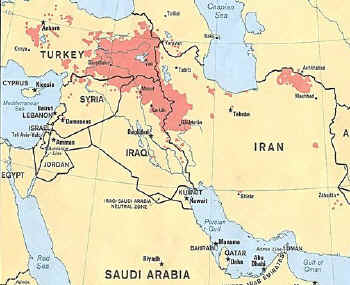Introduction
THE KURDS live mainly in Turkey, Iran and Iraq and probably number about 25-35 million worldwide (though estimates vary). They are the most important ethnic group without a state of their own. They are mostly Sunni Muslims and have their own languages.
About 15 million Kurds live in Turkey, 6 million in Iran, 5 million in Iraq and up to 1.5 million in Syria. Smaller numbers live in former Soviet republics and in Lebanon. Outside their home region, there are about 825,000 Kurds in Europe (550,000 of them in Germany) and some 10,000 in the United States.
Further information: Wikipedia; Columbia Encyclopedia
The Kurds and Islam (International Turkey Network)
Kurdish flags
Plus flags of various Kurdish organisations
Kurdish music (Wikipedia)
Map showing the main areas of Kurdish population (Wikipedia)
History
Kurdish timeline
A chronology of key events since 1918 (BBC)
Kurdish history timeline
From the 7th century (Infoplease)
History of the Kurds (Wikipedia)
Historical background
(International Turkey Network)
Language
Kurdish Language (Wikipedia)
Kurdi
The southern Kurdish language (Ethnologue database). See also languages of Iraq
Kurmanji
The southern Kurdish language (Ethnologue database). See also languages of Turkey
Kurdish Language and Linguistics
A directory of academic work on Kurdish language and linguistics (Edinburgh University)
Politics
Kurdish national aspirations (or fears of them) have become a political issue in Turkey and Iraq, and to a lesser extent in Syria and Iran. The Kurdish Human Rights Project summarises the situation country by country on its website.
Iraqi Kurds suffered atrocities at the hands of Saddam Hussein's regime during the 1980s. Following the 1991 Gulf war, the Kurdish areas of northern Iraq became more or less independent - protected from further attacks by a no-fly zone patrolled by the US and Britain. Since the overthrow of Saddam in 2003, the Kurds' long-term relationship with the Iraqi state has become a major issue.
The main Kurdish political organisations in Iraq are the Kurdistan Democratic Party(KDP) led by Massoud Barzani and the Patriotic Union of Kurdistan (PUK) led by Jalal Talabani.
Political parties
Kurdish political parties (Medea)
Kurdistan Democratic Party (Iran)
Kurdistan Democratic Party (Iraq)
Kurdistan Democratic Party (Syria/Lebanon)
Kurdistan Workers Party (PKK)
Patriotic Union of Kurdistan(PUK)
Also PUK websites in: Australia, France, Germany, Russia
Socialist Party of Kurdistan (SPK)
Komala
A Kurdish Marxist organisation
Documents
Special provisions for the Kurdistan region of Iraq
Kurdistan Regional Government, 20 February 2004
Constitution of the Iraqi Kurdistan Region
Kurdistan Democratic Party, 13 October 2002
Kurdish view on the constitutional future of Iraq
by Nouri Talabany, 18 June, 1999
Washington accord between PUK and KDP
Full text. 17 September, 1998
Alliance between PUK and KDP
21 November, 1994
Paris agreement between PUK and KDP
July, 1993
Media
Kurdistan Observer(in English)
An on-line newspaper, updated daily
Kurdish Media(in English)
"United Kurdish voice"
Kurdistan National Network(in English)
al-Dimoqrati
Newspaper of the Kurdish Democratic Progressive Party in Syria (in Arabic)
Azadiya Welat
Kurdish weekly (in Kurmanci and Zazaki)
Serxwebun
PKK journal
Voice of America in Kurdish



